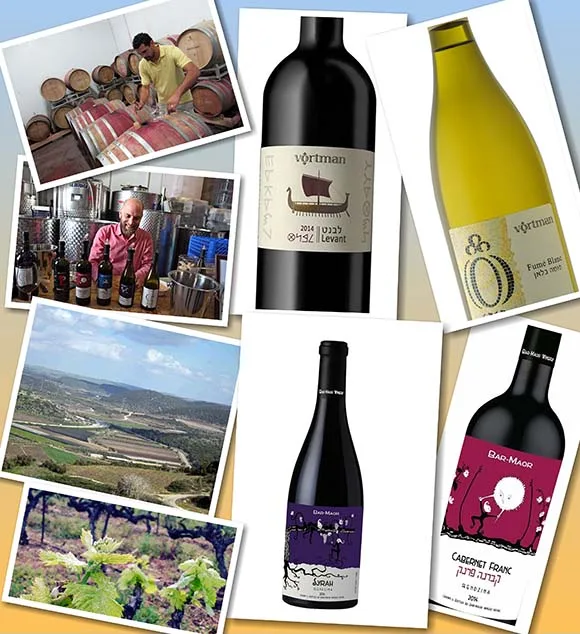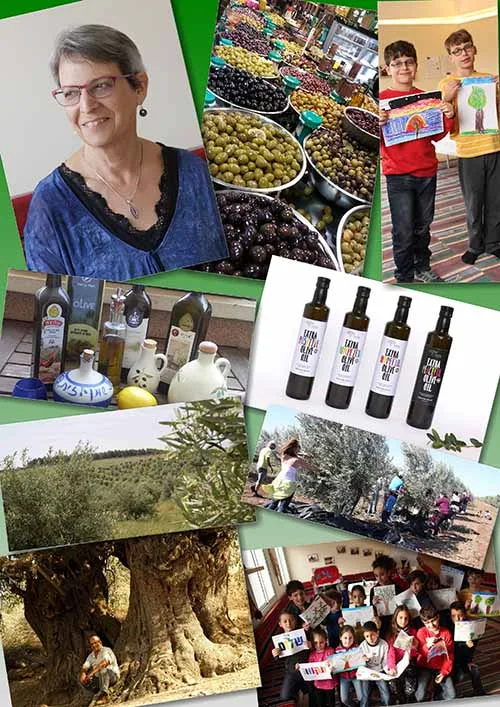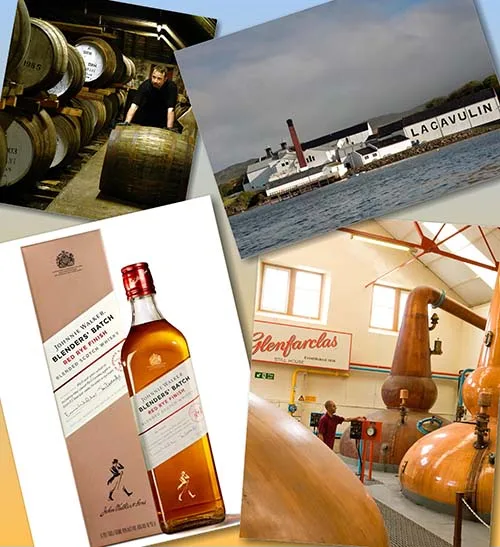Bottle the passion



When Baron Rothschild founded a modern Israeli wine industry, his agronomists chose the valleys surrounding the southern slopes of Mount Carmel. This is the so called mountain range that runs south from Haifa to Zichron Yaacov. Thus the first vineyards were planted in Shefaya and the Hanadiv Valley, near Zichron, but also in areas such as inyamina, Givat Ada, and Givat Nili.

This Chanukah why not light your Menora (Chanukiah) using olive oil to celebrate the existence of this elixir, and while you are at it, give your host a special bottle of Israeli olive oil as a gift? Wine is well covered by Jewish festivals and lifestyle events. There is no lack of opportunities in the Jewish year to say the blessing over wine and enjoy a few glasses and feel righteous at the same time. Chanukah though is a festival that I am at a loss to decide which wine to write about, which is great, because it gives me an excuse to write about olive oil, and it really is the festival of olive oil!
I personally feel the olive and the vine are Siamese twins. They are ever present all over the Mediterranean, certainly no less in the Eastern Mediterranean, but also may be found everywhere in Israel. The beauty of every Israeli landscape contains vines standing up like soldiers or the shimmering green, silvery leaves of the olive tree. The look is Biblical and yet it also is contemporary.

Without doubt, whisky has become the Jewish spirit of choice. It is astonishing how it has simply been adopted by Jews everywhere and it is a constant surprise how many whisky mavens there are within the Jewish community.
You would think Jews from Eastern Europe would be more partial to vodka and those from the Sephardim would prefer Arak, and this is true in Israel. Certainly the largest selling spirit here is vodka and Arak is the indigenous spirit most associated with our corner of the Eastern Mediterranean. However the cachet of whisky looms large, the fascination with the story, taste and complexity has overridden everything else.
What is the Jewish connection to whisky? Maybe, like Chinese food and sushi, with which American Jews are said to have a love affair, whisky has become another sort of ‘safe treyf’. Both Chinese food, sushi and whisky were considered exotic, sophisticated and almost un-Jewish! Lenny Bruce considered it another way: whereas whisky is Jewish and beer is goyish! I suppose the connection started because Jews were more comfortable drinking whisky compared to cognacs or brandies, which had to be certified as kosher because the base product was wine. The best whiskies could therefore be enjoyed without worrying about kashrut. What began as an aspirational status symbol, became the playing field for a raft of new connoisseurs.
Historically in Eastern Europe, Jews were always associated with liquor. By late on in the 18th century, it was said that 15% of Jews living in towns and no less than 85% of Jews in the country, were engaged in the manufacture, distribution or sale of alcohol! It was one of the few industries that they were permitted to take part in and Jews were abstemious enough to be unaffected by the lures of their product.
In the new country, the relationship with alcoholic drinks continued. During Prohibition in the United States many Jewish families found their foothold in the new country by bootlegging whisky. They came from an immigrant community and were hungry for success and acceptance. Bootlegging was high risk. Daring and ingenuity was required, but it was highly profitable. From such beginnings, countless Jews entered the drinks industry as distributors. The Bronfman family from Canada, created Seagram, which became the largest drinks company in the world. Chivas Regal was their greatest creation.
Today there is a very high proportion of drinks companies with Jewish roots in the wine and spirits trade, particularly in the United States. The largest distributors like Southern Wines and Spirits, wine families like Sichel and Hallgarten, and American whiskey brands like IW Harper, Heaven Hill, Jim Beam and Seagram all had Jewish roots.
Gradually whisky became the aspirational American upgrade from schnapps and vodka. Whisky became ever present on the Kiddush table for Shabbat. Now we have Kiddush Clubs. These started as informal groups that would quietly filter out of the synagogue after Haftorah reading, to enjoy an early Kiddush over some prestigious whiskies. Some Rabbis have banned them deeming them inappropriate, others have quietly ignored them, seeing it as a Shabbat attraction. Whatever the view, the Kiddush Club has become a reality and the subject of heated Rabbinical debate. The interest in whisky that started in America has spread to Jewish communities worldwide.
The thorny question of whether to bring a blended whisky or a single malt to a simcha, depends how greatly you esteem your guests. Basically, a single malt is one produced by one distillery, whilst a blended whisky is from more than one distillery. An aged or de luxe blend is one with a higher proportion of aged malt whisky in it. It is always amuses me that to skimp on the Kiddush wine is acceptable, but not to bring a quality whisky is a serious infringement on the pride and ego of the host.
To simplify matters, Glenfiddich, Glenmorangie, Macallan, The Glenlivet, Glenfarclas and The Singleton are single malts. Ballantines, J & B, Grants and Johnnie Walker Red Label are blends. Chivas Regal and Johnnie Walker Black Label are de-luxe blends.
A malt whisky should be drunk on its own or with just a splash of mineral water. This brings out the aromas like rain does on a rose. The best glasses to enjoy it to the maximum are either a copita (Spanish sherry glass) or thistle shaped glass (also used for tasting cognac). These are perfect. The traditional wine tasting glass, similar to a copita would also suffice. If the whisky is in a rich after dinner style, like an older Macallan or The Glenlivet, say 18 years or more, I would even drink it in a brandy balloon glass.
Blended whiskies are best drunk in a whisky tumbler with ice, water or a mixer. The Americans will add ice to everything, the English will add ginger ale and the Scots will even add lemonade. Each to his own!
Scotch is made from water, yeast and barley, so there are no kosher issues with the malting, mashing or distillation process. It is maturation which is a potential problem because the whisky may be aged in used sherry or wine casks. If you disregard this because of bitul b’shishim, which nullifies the unkosher aspect, then orthodox Jews may enjoy whiskies like everyone else.
A few years ago when I worked for Carmel we sent used wine barrels to the Bruichladdich Distillery, to make two wine finish whiskies, with a touch of Israel. The end results were two unique and very fine whiskies.
My favorite malt whiskies are The Balvenie, Glenfarclas and Macallan (particularly when aged in sherry casks) from Speyside, Bruichladdich and Lagavulin (Islay), Springbank (Cambeltown) and Highland Park ( the Orkney Islands). As my own house pouring whisky, I am very satisfied with Johnnie Walker Black Label, an aged blend, which is a great dram. Johnnie Walker is continually producing new prestigious whiskies in the line to capitalize on the brand name of the world’s largest selling whisky. However I think there is a reason it has become so popular and continues to stand out after all these years. The Black Label represents very good value and if underrated, it is only because it is so prolific.
A few years ago I spent a week touring Speyside with one of my sons. Then a few years later we did the same again, but this time in Islay and Cambeltown. With all the tastings we did, my personal conclusion was sometimes that the finest, best balanced malts were the 12 year old, more than the older expressions. Maybe a whisky has an optimum time to be in cask….so do not always assume you have to pay more for the rarer edition to get a superb product.
The main Jewish fetish seems to be with Scotch Whisky (spelt without an e), but there is also whiskey (with an e) produced in America (for example Jim Beam, Jack Daniels), Canada (Seagram), Ireland (Bushmills, Jameson) and Japan (Suntory). In the meantime the Jewish fascination with Scotch has reached Israel. Whereas once purchases were made solely in duty free, now prices have come down and every wine shop has a display of serious whiskies at good prices. It seems to fit perfectly the aspirational nature of Israelis, who love to conquer new subjects and show how much they know.
Excitingly there is a flowering, or rather budding, of a new artisan whiskey distilling industry even here in Israel. French Canadian David Zibell has opened the Golan Heights Distillery in Katzrin and markets his product with very stylish packaging and a great story. Winemaker Tal Pelter better known for Pelter Winery, has also bought a distillery and his early products are having rave reviews.
As far as production of a real whiskey, there needs to be time for the requisite cask aging to mature the final product. They have produced the base product, white whisky in its various forms, which does have an interest for whiskey geeks, but there is a reason why whiskey needs to age. It needs that time to acquire the taste, color and complexity.
However there is a product that qualifies as a real whiskey. It was launched only recently. The honor goes to the Milk and Honey Distillery situated exactly where south Tel Aviv borders Jaffa. The whiskey was distilled in January 2014 and then aged for the required three years (31 months in unused American oak casks and then for another seven months in ex Bourbon casks.) The distiller is Tomer Goren, who consulted with the late Dr. Jim Swan, the internationally renowned Master Distiller. The result is not inexpensive, but the product makes history and will be of interest to the curious.
So now, finally you will be able to make a Le’Haim with an authentic Israeli whiskey! Something original and innovative to take to your Kiddush Club! A great gift for someone who has everything!
Adam Montefiore has been advancing Israeli wines for over 30 years. He is known as the ‘English voice of Israeli wine’. He is the wine writer for the Jerusalem Post.
www.adammontefiore.com